The demand for X-by-Wire in Japan is valued at USD 2.9 billion in 2025 and is projected to reach USD 9.0 billion by 2035, reflecting a compound annual growth rate of 12.0%. Growth is influenced by the increasing integration of electronic control systems in vehicles and the shift toward advanced driver technologies. X-by-Wire systems replace traditional mechanical and hydraulic components with electronic signaling, improving responsiveness, precision and system reliability. As Japan continues to advance its automotive sector, particularly in electrified and autonomous platforms, the use of X-by-Wire components becomes more prevalent in steering, braking and throttle applications. These developments reinforce the rising demand across manufacturers seeking improved performance and reduced mechanical complexity.
The market shows a strong upward trajectory over the forecast period, beginning at USD 1.7 billion in earlier years and reaching USD 2.9 billion in 2025 before continuing toward USD 9.0 billion by 2035. Growth remains consistent, with values increasing from USD 3.2 billion in 2026 to USD 3.7 billion in 2027 and continuing to grow steadily over the timeline. The annual gains reflect expanding adoption of electronic actuation technologies in both passenger and commercial vehicles. As regulatory standards, vehicle safety expectations and platform electrification continue to evolve, X-by-Wire systems gain further ground, contributing to long-term demand supported by engineering advancements and broader industry acceptance.
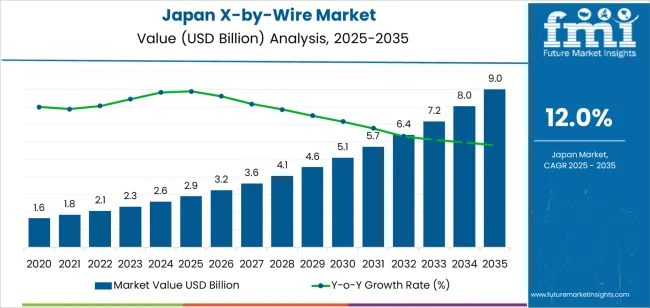
Demand in Japan for X by Wire technology is projected to increase from USD 2.9 billion in 2025 to USD 9.0 billion by 2035, reflecting a compound annual growth rate (CAGR) of approximately 12.0%. Starting from USD 1.7 billion in 2020, the value rises steadily to USD 2.9 billion in 2025, then continues its ascent, reaching USD 4.0 billion in 2028, USD 5.1 billion in 2030, and ultimately USD 9.0 billion by 2035. Growth is driven by increasing adoption of electric and autonomous vehicles, stricter emissions and safety regulations, and a shift from mechanical to electronic control systems, such as steering-by-wire and brake-by-wire, in Japanese automotive manufacturing.
Beyond 2025, the pace of expansion accelerates as upstream components, software control modules, and actuator systems scale in production and integration. As automakers in Japan move toward advanced driver assistance systems (ADAS) and full vehicle electrification, the per-vehicle content of X-by-Wire systems increases, boosting value and installation volumes. The cumulative uplift of roughly USD 6.1 billion over the decade from USD 2.9 billion to USD 9.0 billion underscores both volume growth and rising per-unit system complexity. Suppliers and automotive OEMs should target this growth window for investment in high-precision electronic control technologies and software-enabled vehicle architectures.
| Metric | Value |
|---|---|
| Industry Value (2025) | USD 2.9 billion |
| Forecast Value (2035) | USD 9.0 billion |
| Forecast CAGR (2025 to 2035) | 12.0% |
The demand for X-by-Wire systems in Japan is supported by the increasing shift toward electric vehicles (EVs) and automated driving technologies among Japanese automakers. Systems such as steer-by-wire and brake-by-wire replace traditional mechanical linkages with electronic controls, contributing to vehicle weight reduction and efficiency gains. Research indicates that Japan’s market size for X-by-Wire systems reached approximately USD 1.1 billion in 2024, with projections reaching around USD 3.8 billion by 2033. Automakers in Japan are integrating these systems into new models to comply with tighter emissions standards and to support advanced driver-assistance systems.
Another contributing factor is the growing adoption of autonomous driving features and digital vehicle architectures in Japan. Vehicles designed for higher levels of automation require electronic control over functions previously managed by hydraulics or mechanical components, thus enhancing the relevance of X-by-Wire systems. The shift toward smart mobility and connected vehicles further reinforces demand. At the same time, challenges such as system cost, reliability concerns, and regulatory verification remain. Nevertheless, the trajectory for X-by-Wire system uptake in Japan is upward as vehicle platforms evolve.
The demand for X by Wire in Japan is shaped by the range of system types and the applications in which they are adopted. Types such as throttle by wire, brake by wire, shift by wire, steer by wire and other by wire systems support improved control, reduced mechanical complexity and enhanced vehicle performance. Applications include passenger vehicles and commercial vehicles, each with distinct requirements for electronic actuation. As manufacturers expand the use of electronically managed systems to improve precision and reliability, the combination of system diversity and broad vehicle adoption patterns guides overall demand in the Japanese market.
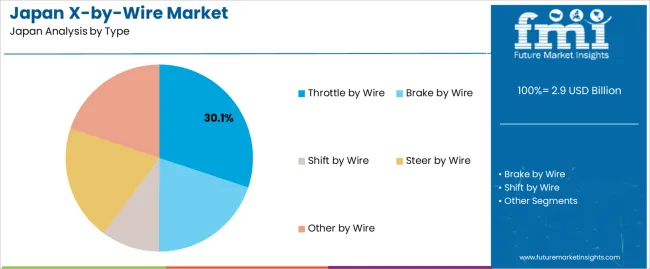
Throttle by wire accounts for 30% of total demand for X by Wire systems in Japan. Its share reflects the widespread integration of electronically controlled throttles in modern vehicles, where precise modulation of engine output supports smoother acceleration and improved driving response. This system replaces mechanical linkages with electronic signals, reducing wear and improving reliability. Manufacturers adopt throttle by wire to enable features such as traction control and stability programs, making it a core system in contemporary vehicle platforms across multiple segments.
The demand for throttle by wire is also driven by its role in supporting powertrain efficiency and compatibility with hybrid and electric architectures. Electronic control allows engineers to calibrate throttle response for different driving modes, improving overall drivability. As Japanese automakers continue to refine engine management strategies and increase the use of electronically coordinated systems, throttle by wire remains a foundational technology. Its integration across a broad range of vehicles ensures steady demand within the X by Wire category.
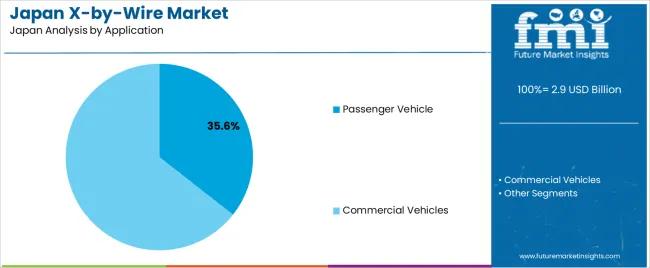
Passenger vehicles account for 35.6% of total demand for X by Wire applications in Japan. This leading share stems from the wide incorporation of electronic actuation systems in everyday cars to enhance performance, comfort and safety. Passenger vehicle platforms frequently adopt throttle by wire, brake assist features and shift by wire modules, which rely on electronic signals for consistent operation. As consumer expectations for refined driving experiences increase, manufacturers integrate these systems to deliver smoother operation and precise control in a range of driving conditions.
Demand from passenger vehicles is also supported by growing adoption of advanced driver assistance systems that require accurate electronic coordination. X by Wire technologies allow electronic controllers to manage functions with greater precision than mechanical linkages. This integration strengthens system responsiveness and supports the design of more adaptable vehicle architectures. As passenger vehicle development continues to move toward higher electronic content, X by Wire adoption expands, maintaining the segment’s leading position in Japan.
The demand for vehicle X-by-Wire systems (such as steer-by-wire, brake-by-wire, shift-by-wire) in Japan is being shaped by the country’s push toward vehicle electrification, autonomous driving technologies, and advanced driver-assistance systems (ADAS). Japanese automakers and suppliers are developing lighter, more electronically controlled vehicle platforms which favour X-by-Wire adoption. At the same time, barriers include existing regulatory approvals, system reliability concerns, and the higher cost of electronics versus traditional mechanical linkages. These factors together determine how rapidly X-by-Wire systems penetrate Japanese vehicles.
How are the shift toward electric and autonomous vehicles influencing demand for X-by-Wire systems in Japan?
Japan’s transition to electric vehicles (EVs) and interests in autonomous driving are providing strong impetus for X-by-Wire systems. As vehicles increasingly remove mechanical linkages and adopt software-defined controls, X-by-Wire offers benefits in weight reduction, packaging flexibility, and simplified integration with vehicle control networks. Reports indicate that as EV production and ADAS feature adoption grow in Japan, the requirement for X-by-Wire systems rises accordingly. Thus automakers see X-by-Wire as a key enabler in next-generation mobility platforms.
What opportunity exists for X-by-Wire systems in Japan’s automotive supply chain?
An opportunity for X-by-Wire systems in Japan lies in its high-tech automotive supply base and strong R&D ecosystem. Japanese vehicle manufacturers and suppliers can leverage local expertise in electronics, mechatronics and software to integrate X-by-Wire systems into domestic vehicle platforms. Further, demand from commercial vehicles and shared mobility segments offers potential for adoption beyond passenger cars. With increasing regulatory focus on vehicle safety and emissions, X-by-Wire presents a pathway for differentiation in advanced mobility solutions in Japan.
What challenges are limiting broader adoption of X-by-Wire systems in Japan?
Several challenges restrict faster uptake of X-by-Wire systems in Japan. One major hurdle is the high cost and complexity of ensuring fail-safe operation, redundancy and cybersecurity for electronically- controlled vehicle functions. In addition, many vehicles still rely on conventional mechanical or hydraulic systems, and legacy manufacturing infrastructures may slow transition. Regulatory standards for safety and certification of fully by-wire systems remain stringent in Japan, which can delay mass deployment. These issues moderate expansion in both passenger vehicles and commercial platforms.
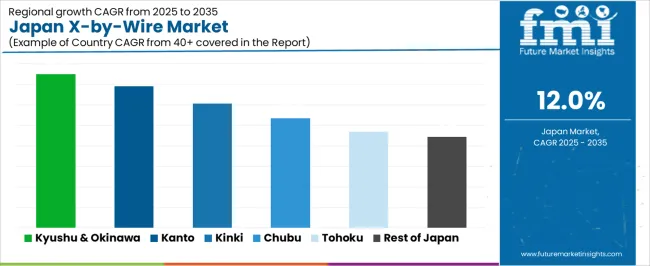
| Region | CAGR (%) |
|---|---|
| Kyushu & Okinawa | 15.0% |
| Kanto | 13.8% |
| Kinki | 12.1% |
| Chubu | 10.7% |
| Tohoku | 9.4% |
| Rest of Japan | 8.9% |
Demand for X-by-Wire in Japan is expanding across regions, with Kyushu and Okinawa leading at 15.0%. Growth in this region reflects rising automotive production activity and increasing use of electronic control systems in new vehicle platforms. Kanto follows at 13.8%, supported by its concentration of automotive design centers and strong development activity among major manufacturers. Kinki records 12.1%, driven by established suppliers and growing integration of electronic steering and braking systems. Chubu grows at 10.7%, anchored by its role as a core automotive manufacturing base. Tohoku reaches 9.4%, showing steady adoption across regional facilities. The rest of Japan posts 8.9%, reflecting broader interest in replacing mechanical components with electronically controlled systems.
Kyushu & Okinawa is projected to grow at a CAGR of 15.0% through 2035 in demand for X-by-Wire systems. The region’s automotive industry, particularly in Fukuoka, is adopting electronic steering, braking, and throttle-by-wire technologies to enhance vehicle efficiency, safety, and responsiveness. Rising demand for electric and hybrid vehicles accelerates the adoption of X-by-Wire systems in passenger and commercial vehicles. Automotive manufacturers in the region are integrating advanced electronic control systems to reduce mechanical components and improve performance. The region’s focus on technological innovation in mobility continues to drive the market.
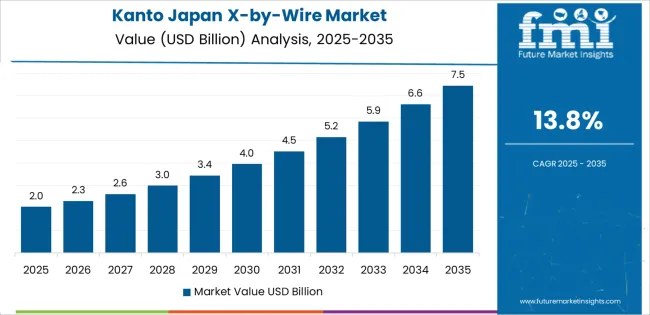
Kanto is projected to grow at a CAGR of 13.8% through 2035 in demand for X-by-Wire systems. As Japan’s automotive and technology hub, including Tokyo, the region leads in the adoption of electronic vehicle control systems. The rise in hybrid, electric, and autonomous vehicles contributes to growing demand for steering-by-wire, brake-by-wire, and throttle-by-wire technologies. Automotive manufacturers are increasingly focusing on vehicle automation, efficiency, and safety features, which require X-by-Wire systems. Kanto’s concentration of R&D centers, suppliers, and technology-driven manufacturers supports the implementation and scaling of these advanced automotive systems.
Kinki is projected to grow at a CAGR of 12.1% through 2035 in demand for X-by-Wire systems. The region’s automotive industry, including Osaka and Kyoto, is increasingly integrating electronic control systems for enhanced vehicle safety, performance, and efficiency. Rising consumer demand for electric and semi-autonomous vehicles drives the need for X-by-Wire technologies. Manufacturers are investing in steering, braking, and throttle-by-wire systems to reduce mechanical linkages and enhance precision. The region’s focus on innovative vehicle technologies and regulatory compliance with safety and emission standards accelerates the adoption of X-by-Wire systems across automotive platforms.
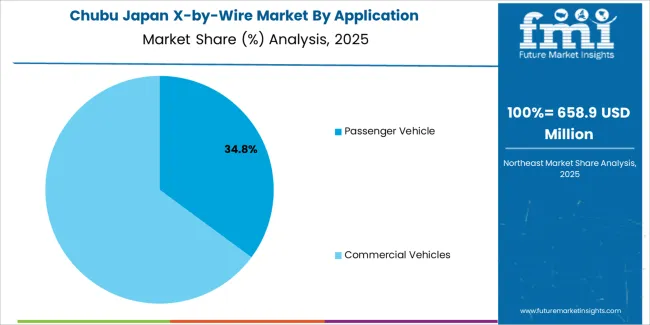
Chubu is projected to grow at a CAGR of 10.7% through 2035 in demand for X-by-Wire systems. The region’s industrial hubs, particularly Nagoya, are home to automotive manufacturing and assembly facilities integrating electronic control systems. As the demand for electric and hybrid vehicles grows, X-by-Wire technologies are increasingly used to replace traditional mechanical components. Manufacturers in Chubu focus on vehicle efficiency, precision, and automation, driving adoption. The region’s commitment to advanced mobility solutions and innovation in electronic vehicle control contributes to the steady growth of X-by-Wire systems in passenger and commercial vehicles.
Tohoku is projected to grow at a CAGR of 9.4% through 2035 in demand for X-by-Wire systems. The region’s automotive manufacturing facilities are gradually adopting electronic steering, brake, and throttle systems to improve safety, efficiency, and performance. While less industrialized than major hubs, Tohoku is investing in advanced automotive technologies to support the growing demand for electric and hybrid vehicles. Manufacturers are implementing X-by-Wire systems to reduce mechanical complexity, enhance vehicle control, and comply with emission and safety standards, contributing to the region’s steady market growth.
The Rest of Japan is projected to grow at a CAGR of 8.9% through 2035 in demand for X-by-Wire systems. Smaller cities and rural areas are gradually integrating electronic vehicle control systems to support electric, hybrid, and semi-autonomous vehicles. Automotive assembly and component manufacturing are adopting X-by-Wire technologies to improve precision, safety, and operational efficiency. The focus on reducing mechanical components and enhancing vehicle automation drives adoption. Continued expansion of mobility solutions, along with government initiatives supporting automotive electrification, further contributes to the growing demand for X-by-Wire systems across non-major regions of Japan.
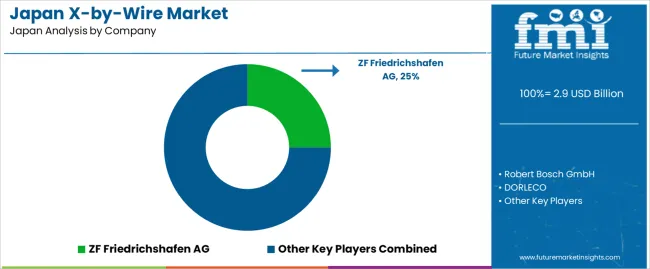
The demand for X-by-Wire systems in Japan is driven by the rapid shift toward electrified and highly automated vehicles. As automakers reduce reliance on mechanical linkages, electronic control systems become essential for achieving precise steering, braking, and acceleration responses. Japan’s strong focus on safety, performance and reduced vehicle weight supports wider adoption of wire-based control architectures across passenger and commercial vehicle platforms.
The growth of hybrid and battery-electric models increases the need for integrated electronic control systems that enhance efficiency and driver assistance features. Rising interest in autonomous mobility further accelerates demand, as X-by-Wire systems allow greater flexibility in vehicle design and enable seamless software-controlled operation. These conditions create steady, long-term expansion for advanced electronic actuation technologies in Japan.
Key companies shaping the X-by-Wire industry in Japan include ZF Friedrichshafen AG, Robert Bosch GmbH, DORLECO, Nexteer Automotive, Forvia and thyssenkrupp AG. These firms provide steer-by-wire, brake-by-wire and related electronic control systems tailored to Japanese automaker requirements.
Their engineering capabilities support high reliability, precise actuation and strong integration with vehicle software platforms. Collaborations with domestic manufacturers allow them to align their systems with Japan’s technical standards and production needs. Their focus on electronic control technologies helps accelerate adoption across next-generation vehicle programs, including electric and autonomous models. By advancing system performance and offering strong technical support, these companies play a central role in shaping the future of X-by-Wire solutions in Japan.
| Items | Values |
|---|---|
| Quantitative Units (2025) | USD billion |
| End Use | Passenger Vehicles, Commercial Vehicles, Electric Vehicles, Hybrid Vehicles, Autonomous and Semi-Autonomous Platforms |
| System Types | Throttle by Wire, Brake by Wire, Shift by Wire, Steer by Wire, Other by Wire |
| Applications | Passenger Vehicles, Commercial Vehicles |
| Regions Covered | Kyushu & Okinawa, Kanto, Kinki, Chubu, Tohoku, Rest of Japan |
| Countries Covered | Japan |
| Key Companies Profiled | ZF Friedrichshafen AG, Robert Bosch GmbH, DORLECO, Nexteer Automotive, Forvia, thyssenkrupp AG |
| Additional Attributes | Dollar by sales across system types and vehicle applications; adoption trends in EVs, hybrids, and autonomous vehicles; regulatory and safety compliance factors; vehicle platform integration; software and actuator module innovation; regional automotive production activity. |
The demand for X-by-Wire in Japan is estimated to be valued at USD 2.9 billion in 2025.
The market size for the X-by-Wire in Japan is projected to reach USD 9.0 billion by 2035.
The demand for X-by-Wire in Japan is expected to grow at a 12.0% CAGR between 2025 and 2035.
The key product types in X-by-Wire in Japan are throttle by wire, brake by wire, shift by wire, steer by wire and other by wire.
In terms of application, passenger vehicle segment is expected to command 35.6% share in the X-by-Wire in Japan in 2025.






Our Research Products

The "Full Research Suite" delivers actionable market intel, deep dives on markets or technologies, so clients act faster, cut risk, and unlock growth.

The Leaderboard benchmarks and ranks top vendors, classifying them as Established Leaders, Leading Challengers, or Disruptors & Challengers.

Locates where complements amplify value and substitutes erode it, forecasting net impact by horizon

We deliver granular, decision-grade intel: market sizing, 5-year forecasts, pricing, adoption, usage, revenue, and operational KPIs—plus competitor tracking, regulation, and value chains—across 60 countries broadly.

Spot the shifts before they hit your P&L. We track inflection points, adoption curves, pricing moves, and ecosystem plays to show where demand is heading, why it is changing, and what to do next across high-growth markets and disruptive tech

Real-time reads of user behavior. We track shifting priorities, perceptions of today’s and next-gen services, and provider experience, then pace how fast tech moves from trial to adoption, blending buyer, consumer, and channel inputs with social signals (#WhySwitch, #UX).

Partner with our analyst team to build a custom report designed around your business priorities. From analysing market trends to assessing competitors or crafting bespoke datasets, we tailor insights to your needs.
Supplier Intelligence
Discovery & Profiling
Capacity & Footprint
Performance & Risk
Compliance & Governance
Commercial Readiness
Who Supplies Whom
Scorecards & Shortlists
Playbooks & Docs
Category Intelligence
Definition & Scope
Demand & Use Cases
Cost Drivers
Market Structure
Supply Chain Map
Trade & Policy
Operating Norms
Deliverables
Buyer Intelligence
Account Basics
Spend & Scope
Procurement Model
Vendor Requirements
Terms & Policies
Entry Strategy
Pain Points & Triggers
Outputs
Pricing Analysis
Benchmarks
Trends
Should-Cost
Indexation
Landed Cost
Commercial Terms
Deliverables
Brand Analysis
Positioning & Value Prop
Share & Presence
Customer Evidence
Go-to-Market
Digital & Reputation
Compliance & Trust
KPIs & Gaps
Outputs
Full Research Suite comprises of:
Market outlook & trends analysis
Interviews & case studies
Strategic recommendations
Vendor profiles & capabilities analysis
5-year forecasts
8 regions and 60+ country-level data splits
Market segment data splits
12 months of continuous data updates
DELIVERED AS:
PDF EXCEL ONLINE
Demand Signal Repository Solutions Market Size and Share Forecast Outlook 2025 to 2035
Demand Side Management Market Size and Share Forecast Outlook 2025 to 2035
Demand Response Market Analysis - Size, Share, and Forecast Outlook 2025 to 2035
North America Shipping Supplies Market Trends – Innovations & Growth 2024-2034
Demand of Kozani Saffron in Greece Analysis - Size, Share & Forecast 2025 to 2035
Demand of No-acid Whey Strained Dairy Processing Concepts in European Union Size and Share Forecast Outlook 2025 to 2035
Demand for Bronte Pistachio in Italy Analysis - Size, Share & Forecast 2025 to 2035
Demand and Trend Analysis of Gaming Monitor in Western Europe Size and Share Forecast Outlook 2025 to 2035
Demand and Trend Analysis of Gaming Monitor in Korea Size and Share Forecast Outlook 2025 to 2035
Demand and Trend Analysis of Gaming Monitor in Japan Size and Share Forecast Outlook 2025 to 2035
Glycine Soja (Soybean) Seed Extract Market Size and Share Forecast Outlook 2025 to 2035
Demand and Trend Analysis of Yeast in Japan - Size, Share, and Forecast Outlook 2025 to 2035
Demand of Pistachio-based desserts & ingredients in France Analysis - Size, Share & Forecast 2025 to 2035
Western Europe Men’s Skincare Market Analysis – Forecast 2023-2033
Demand and Trends Analysis of Stevia in Japan Size and Share Forecast Outlook 2025 to 2035
Japan Women’s Intimate Care Market Trends – Growth & Forecast 2024-2034
Demand and Trend Analysis of Fabric Stain Remover in Korea Size and Share Forecast Outlook 2025 to 2035
Demand and Sales Analysis of Paper Cup in Korea Size and Share Forecast Outlook 2025 to 2035
Demand and Sales Analysis of Paper Cup in Western Europe Size and Share Forecast Outlook 2025 to 2035
Demand of MFGM-enriched Powders & RTDs in European Union Size and Share Forecast Outlook 2025 to 2035

Thank you!
You will receive an email from our Business Development Manager. Please be sure to check your SPAM/JUNK folder too.
Chat With
MaRIA